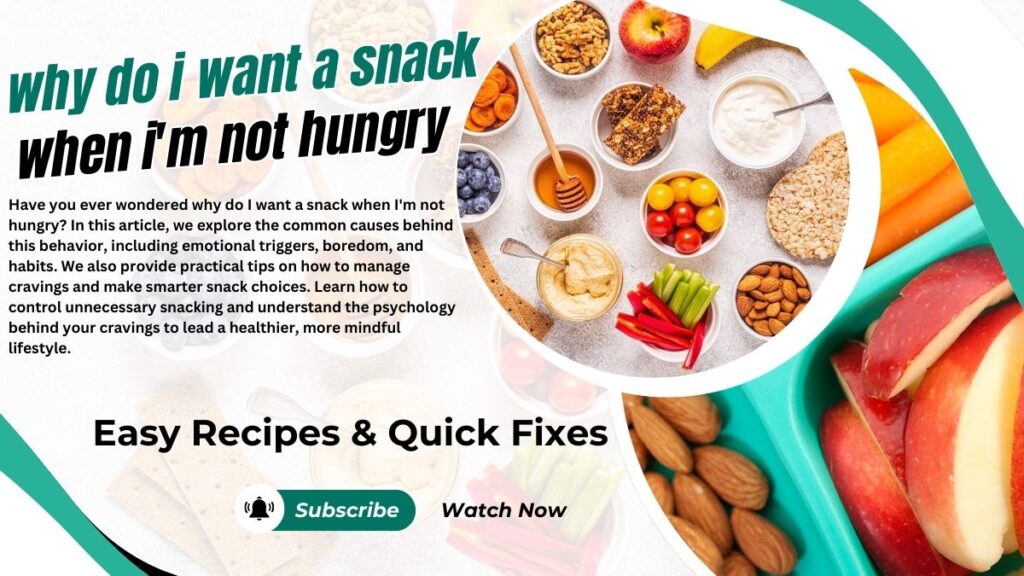Why Do I Want a Snack When I’m Not Hungry?
You might think, why do I want a snack when I’m not hungry? This common scenario happens for various reasons, ranging from emotional triggers to everyday habits.
In this LivingRedo article, we’ll explore why these cravings occur, how to manage them, and actionable tips to snack smarter.
The Difference Between Hunger and Cravings
To understand why you might want a snack even when you’re not hungry, it’s important to distinguish between hunger and cravings.
- Hunger: This is your body’s natural signal that it needs energy. Signs include a growling stomach or low energy.
- Cravings: These come from your brain, not your stomach, and are often triggered by emotions, habits, or sensory cues like seeing food.
When you feel like snacking without being hungry, it’s likely a craving rather than true hunger.
Why Do I Want a Snack When I’m Not Hungry?
Understanding what triggers unnecessary snacking can help you regain control. Here are the most common reasons:
Emotional Eating
Emotional eating is a major factor behind the question: why do I want a snack when I’m not hungry? Stress, sadness, or even happiness can make you reach for comfort foods. Foods like chocolate release dopamine, a feel-good chemical that can temporarily boost your mood.
Anecdote: Emily, a marketing professional, found herself snacking on chips after stressful meetings. Once she identified this pattern, she started using stress-relief techniques like deep breathing instead.
Boredom
Boredom is another common trigger for unnecessary snacking. When your mind isn’t engaged, eating can feel like an easy way to pass the time.
Habits
Snacking can become an automatic behavior. For instance, if you always eat popcorn while watching TV, your brain links the activity to snacking, even if you’re not hungry.
Stress and Cortisol
Cortisol is released in response to stress, a hormone that increases cravings for high-sugar or high-fat foods. These foods might momentarily reduce tension and give you a brief energy boost.
Sleep Deprivation
When you don’t get enough sleep, hunger-regulating hormones like ghrelin and leptin become imbalanced. This makes you feel hungrier and more likely to snack, even if your body doesn’t need food.
How to Manage Cravings
If you often wonder, why do I want a snack when I’m not hungry? follow these steps to curb unnecessary cravings:
Step 1: Pause and Reflect
Before grabbing a snack, take a moment to ask yourself:
- Am I truly hungry?
- Is this craving due to boredom or stress?
Pausing can help you recognize whether you need food or if it’s just an emotional or habitual response.
Step 2: Drink Water
Sometimes, thirst can feel like hunger. Drink a glass of water and wait for a few minutes. If the craving subsides, you are likely just thirsty.
Step 3: Engage Your Mind
If you’re snacking out of boredom, find another activity. Go for a walk, call a friend, or even do a quick puzzle to keep your mind busy.
Step 4: Snack Smart
If you decide to snack, choose something nutritious. Options like fruits, nuts, or Greek yogurt are satisfying and healthier than processed snacks.
Health Benefits of Mindful Snacking
Mindful snacking can bring many health benefits, mainly when choosing nutritious options and knowing why we eat. Rather of aimlessly grabbing a bag of sweets or chips when you’re worried or bored, mindful snacking encourages us to listen to our bodies and eat only when necessary. By selecting healthier snacks, such as fruits, nuts, or Greek yogurt, we can improve our energy levels, stabilize blood sugar, and maintain a healthy weight. Moreover, mindful snacking helps reduce emotional eating, often triggered by stress or boredom, leading to better mental health and overall well-being. Embracing this approach can help break unhealthy habits, improve digestion, and give our bodies the nourishment they need without overindulging.
Tips for Smarter Snacking
When cravings hit, you don’t have to avoid snacking entirely. Here’s how to do it wisely:
Portion Control
Instead of eating straight from the bag, serve a small portion in a bowl. This helps prevent overeating.
Pair Snacks with Protein
Combine carbs with protein or healthy fats to feel fuller longer. For example, an apple with peanut butter or whole-grain crackers with cheese.
Stick to a Routine
Having consistent meal times reduces the likelihood of grazing throughout the day.
Why This Matters
Understanding the reasons behind your cravings is key to managing them. Whether it’s emotional eating, boredom, or habit, identifying the trigger helps you make more mindful choices.
FAQs
Final Thoughts
Next time you think, why do I want a snack when I’m not hungry? pause and reflect. Are you responding to an emotional trigger or just a habit? Taking these small steps can make a big difference in how you approach snacking.
Remember, it’s not about completely avoiding snacks but enjoying them in a balanced, mindful way. Life is all about balance, and your favorite treat can still fit into a healthy lifestyle.

